"I'm Responsible for Changing the World."
By Christine Wahl
Performer*, choreographer* and director* Heinrich Horwitz stages with a fluid collective artistic reflections on non-binary being and the being and the social role of gender and sex. 2023 the Fonds honors this artistic work with the Tabori Award.
Cultural journalist Christine Wahl asks in an interview what significance this honor has.
Heinrich Horwitz, it wasn’t at all easy to find a date for this interview because you are extremely busy: You direct and also perform yourself in various theater collectives and contexts, in addition to frequently appearing in films and performing regularly with the new music ensemble Decoder, including at Hamburg's Elbphilharmonie. What are you mainly working on at the moment?
Heinrich Horwitz: We're currently conceptualizing a project at Ballhaus Ost in Berlin called Flipper, which refers to a myth. I started to deal with different myths a few years ago. I think it's because I'm a big skeptic about the idea of a single truth. I am interested in a multi-perspective view of the world.
And myths are particularly well suited to this viewpoint, because they have been retold over and over again for centuries or even millennia and have therefore always had an inherent idea of transformation?
Horwitz: Yes, using the carrier bag theory of the American writer Ursula K. Le Giun, we could say that we are basically constantly putting stories into our carrier bag and that these stories change there, because we are always retelling them, but we do so very differently, from our different perspectives. The multi-perspective is also an important aspect at the level of our collaboration. For me, an essential part of Flipper is that each member of the team enters the project with a different entry point, that they all bring very different skills to the table. That's exactly what I'm looking for – in principle, in all my work. I'm not interested in a directorial concept in which everyone then somehow has to find their place, but rather, in the casting processes or in putting together teams, I'm interested in what the people in question bring to the table, how they themselves relate to the subject of the work, where they can specifically find a starting point.
One of your most recent projects – Amazon Rising from 2021 – dealt with Amazon myths. Which myth is Flipper about?
Horwitz: I worked on the Amazon myth for three years and actually came to a point that was so essential for me that I'm connecting to it with my current project. It's about the 10 percent myth, which claims that we humans only use 10 percent of our total brain capacity. This theory must, of course, be viewed critically, because certain spiritualist sects immediately appropriated it and, on this basis, formulated a path to becoming a better human being in their own terms. However, the myth also states that there is exactly one mammal that uses more than this 10 percent of its brain capacity: the dolphin.
By how many percent is it ahead of us humans?
Horwitz: In relation to body mass and brain size, dolphins work with 13 percent of their total brain capacity – so they are 3 percent ahead. And these 3 percent are found in their empathic abilities and practices. They even have a part of the brain that we humans don't have, where essential emotional processes take place. That's why our theory in Flipper is that the appropriate use of our untapped potential – wherever it is exactly in the human body, we don't even address this point – would lead to us becoming more empathic. And in our project, we try to address and practice this empathy on different levels at the same time: on the one hand, in a multi-perspective research and on the other hand, in the conscious inclusion of the most diverse skills of the participants. In the performance itself we investigate which structures the human being can connect with and which connections they can make in order to become a more tender, more open organism.
 © Katja Feldmeier
© Katja Feldmeier
"Amazon Rising"
The theme of transformation appears again and again in your work: already in Amazon Rising you designed the "Amazon of the future" and in performative activist processions through Berlin you promoted the transformation of this mythical figure into an empathic, new cyborg being.
Horwitz: I am disquieted when it comes to language. Although I studied at a drama school and actually had this classical spoken theater path in front of me, I quickly felt a resistance to accepting language as the central, quasi overpowering tool on stage. And the myths, interestingly enough, now allow me a kind of re-engagement with language, because they are stories that are allowed to change. There is no untouchable authorship in it, no cult of genius. In principle, I am interested in the body, in dance in the broadest sense, but also in non-professionalized bodies with their own forms of speaking, and in music – as something unifying, open to interpretation.
Let's get back to the "classical spoken theater path". You were born in 1984 and once said yourself that you practically grew up in the theater, especially at the Hamburg Thalia, where your father – the actor Dominique Horwitz – was one of the most influential protagonists at the time.
Horwitz: Growing up in a theater – in such a fantastic space – was wonderful for me. I still draw on that, even though I would say that, in addition to the many enriching experiences I have since had in my professional life, there were also violent toxic ones there that I could well have done without. I have totally fond memories of those childhood days. This feeling that the theater means home – a place of being at home, of living – has remained. Especially since at some point, of course, I began to find collaborators in these theaters with whom I identify much more than with Robert Wilson, for example.
In the noughties, you studied directing and choreography at the renowned Ernst Busch Academy of Dramatic Arts in Berlin. Did you already sense during your training that you were artistically more interested in performance, action, happenings and music than in the aforementioned classical spoken word and theater path?
Horwitz: I think it's great that there are fellow students of mine who have taken this classical path and are staging dramatic texts! But already during my studies I actually began to increasingly forgo text and look for an alternative form of speaking. This was also related to the fact that I couldn't find a text that had anything to do with the reality of my life. At the beginning I thought that this was probably exactly my job as a director: to tell stories that are not mine. But at some point, I realized that I'm not the only one who feels that way. And from this I derive a responsibility that I want to acknowledge: that I, like everyone else, am also responsible for changing the world. That sounds gigantic now, of course – but it's actually meant in a very basic way. Namely in the sense of what bodies are to be seen on stage, what these bodies express, and what they deal with. In the meantime, it has become clear to me that my art can no longer be separated from my political activism.
 © Katja Feldmeier
© Katja Feldmeier
Performance "Der Unzeitige Gast"
You were among the 185 initial signatories of the #ActOut manifesto, which advocates for the acceptance, recognition and visibility of LGBTIQ+ people within the film, television, and theater industries, and in society more generally. This manifesto was published in the Süddeutsche Zeitung in February 2021 as a joint coming out of those 185 actors as lesbian, gay, bisexual, transgender, queer, intersex or non-binary. In addition, you repeatedly speak publicly about your own emancipation from a clear gender attribution and about your identification as a non-binary trans person. What effect have all these initiatives had in the meantime?
Horwitz: We've grown a lot, which is great! People are contacting us, and not only as a signatory of the #ActOut manifesto, but basically as a person who works in theater and is interested in diversification processes, I sit – I would guess – on a panel or give an interview on the topic at least once a month. In other words, it's work that hasn't stopped, but fortunately has continued steadily, even if not as massively as in the first year. As far as film and television are concerned, it’s noticeable that at least people are beginning to tell stories differently, and it's happening as well in theater. The mistakes that are made in doing so are part of any process of change.
What mistakes do you see specifically?
Horwitz: I often think it would be good if people asked more. I have the feeling that now we are all invited, and everyone wants to tell these stories and get in touch with us, so to speak, or with marginalized groups in society in general, but often the spaces are then not protected accordingly. For example, there is a lack of advance preparation at the theater, where it has to be made clear to the employees what such a binary gender system – women's and men's tailoring, women's and men's toilets, etc. -– means for a non-binary trans person. So, it's about very basic things: that the team is informed beforehand and also encouraged to ask, for example, about what pronoun the person wants to be addressed by. It's simply important that everyone has the courage and the desire to talk to each other!
What does the Tabori Prize mean to you?
Horwitz: My team and I are delighted that our work has been recognized, and I would like to say once again that the award is for all of us – these wonderful people with whom I have been able to develop new things for years, especially Rosa Wernecke, Magdalena Emmerig and Annett Hardegen. I also hope that this award will help increase the visibility of the perspectives of a non-binary trans artist. The Tabori Prize is also there for all my queer siblings who stand alongside us. Being more allied, confronting intersectional discrimination and having allies is essential.
Let’s finish by going back to the beginning, to the many artistic genres and forms of expression you practice: from choreography to (new) music, from acting to directing. How do you manage to keep all these balls in the air with the same commitment and enthusiasm?
Horwitz (laughs): It's true: I do it all – and I totally love doing it all! Last year, for example, I really worked insanely hard: eight productions – and all projects close to my heart! But I only acted in one of them myself. In such years I always think: Oh, I would like to act more, and when I actually act more again, I miss directing for sure. I think I love my professions – it's as simple as that!